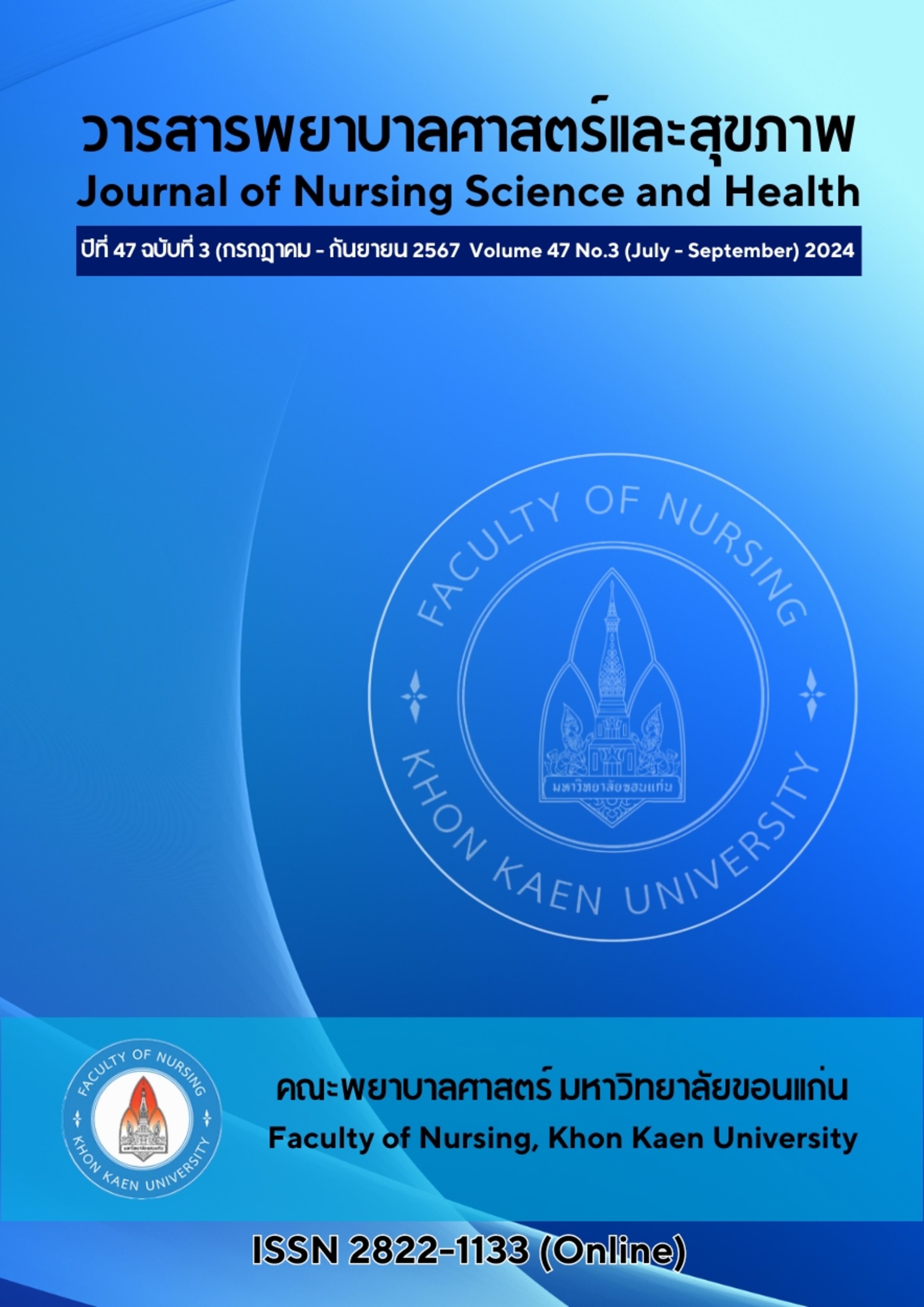ความท้าทายของพยาบาลในการดูแลผู้ป่วยโรคปอดอุดกั้นเรื้อรัง: ยุควิถีถัดไป
คำสำคัญ:
บทบาทพยาบาล , พฤติกรรมการจัดการตนเอง , ยุควิถีถัดไป, โรคปอดอุดกั้นเรื้อรังบทคัดย่อ
โรคปอดอุดกั้นเรื้อรังเป็นสาเหตุสำคัญของการเสียชีวิตในอันดับต้น ๆ ของประชากรทั่วโลก โดยส่ง ผลกระทบต่อระบบทางเศรษฐกิจและสังคมที่เพิ่มมากขึ้น เนื่องจากต้องเผชิญกับความท้าทายหลังการระบาดใหญ่ของโรคโควิด-19 ในช่วงระยะเวลาที่ผ่านมา การระบาดของโรคครั้งนี้ ส่งผลกระทบต่อระบบการดูแลสุขภาพของผู้ป่วยโรคปอดอุดกั้นเรื้อรังเป็นอย่างมากไม่ว่าจะเป็นเรื่องของการส่งเสริมสุขภาพ ป้องกันโรค รักษา และควบคุมโรค จากผลกระทบดังกล่าวทำให้การเข้าถึงระบบบริการสุขภาพ และพฤติกรรมการจัดการตนเองของผู้ป่วยลดลง
บทบาทสำคัญของพยาบาลในการดูแลผู้ป่วยโรคปอดอุดกั้นเรื้อรัง คือ การส่งเสริมพฤติกรรมการจัดการตนเอง เช่น การให้คำแนะนำด้านสิ่งแวดล้อม อาหารและโภชนาการ การฟื้นฟูสมรรถภาพปอด การออกกำลังกาย การจัดการกับความเครียด รวมถึงการส่งเสริมการใช้ยาที่ถูกต้องและเหมาะสม ผ่านการให้ความรู้ สอนทักษะ ในการปฏิบัติกิจกรรม และสร้างความมั่นใจให้กับผู้ป่วยในการปฏิบัติกิจกรรมนั้น ๆ
สำหรับพยาบาลนั้น นับว่าเป็นเรื่องที่ท้าทายอย่างมากในการปรับรูปแบบและบทบาทการพยาบาล ให้มีความเหมาะสมกับบริบทสถานการณ์ยุควิถีถัดไป (next normal) โดยเฉพาะบทบาทด้านการส่งเสริมและป้องกัน เพื่อให้เกิดความเหมาะสมและสอดคล้องกับรูปแบบการให้บริการสุขภาพ รวมไปถึงการใช้ชีวิตของผู้ป่วยโรคปอดอุดกั้นเรื้อรังในปัจจุบัน โดยมีเป้าหมายเพื่อที่จะให้ผู้ป่วยนั้น สามารถควบคุมความเจ็บป่วยของตนเองได้ ป้องกันการเกิดภาวะแทรกซ้อน และลดระดับความรุนแรงของโรค เพื่อคงไว้ซึ่งภาวะสุขภาพและคุณภาพชีวิตที่ดี
เอกสารอ้างอิง
Global Initiative for Chronic Obstructive Lung Disease. Global strategy for the diagnosis, management, and prevention of chronic obstructive pulmonary disease [Internet]. 2024. [Cited 2024 May 3]; Available form: https://goldcopd .org /2024-gold-report/
Boers E, Barrett M, Su JG, Boers E, Barrett M, Su JG, et al. Global burden of chronic obstructive pulmonary disease through 2050. JAMA Netw Open 2023;6(12):1-12.
Health Data Center. Morbidity and death from chronic obstructive pulmonary disease [Internet]. 2024. [Cited 2024 May 1]; Available form: https://hdcservice.moph.go.th /hdc/main/search.php?search (in Thai)
Division of Health Economics and Health Security. Chronic obstructive pulmonary disease (COPD) [Presentation]. Meeting to select topics for health problems and/or technology enter the assessment to develop a set of benefits under the National Health Security System. (2019, 28 January), Nonthaburi, Thailand. (in Thai)
Thoracic Society of Thailand under Royal Patronage. Clinical practice guideline for chronic obstructive pulmonary disease. Thailand: parbpim; 2022. (in Thai)
Sungmontorn K, Krajaiklang S, Wansaen P. The development of care model for patient with chronic obstructive pulmonary disease in Surin Hospital. MJSBH 2021;36(2):327-42. (in Thai)
Lorig KR, Holman H. Self-management education: history, definition, outcomes, and mechanisms. Ann Behav Med 2003;26(1):1-7.
Schrijver J, Lenferink A, Brusse-Keizer M, Zwerink M, van der Valk PD, van der Palen J, et al. Self-management interventions for people with chronic obstructive pulmonary disease. Cochrane Database Syst Rev 2022;2022(1):CD002990.
Banluesin S. Review reports the impact of the COVID-19 outbreak on non-communicable diseases and global related factors [Internet]. 2021. [Cited 2024 March 15]. Available form: http://thaincd.com /document/file/download/knowledge/Report_Impacts_of_ COVID19_on_NCDs_at_global_level_v5_final_by_editor_03.09.64.pdf (in Thai)
Communicable Diseases. Review report impact of COVID-19 to the chronic non-communicable disease service system [Internet]. 2021. [Cited 2024 March 11]. Available form: http://www.thaincd.com/2016/media-detail.php?id=14088&tid=&gid=1-015-005.6 (in Thai)
Curley C. Living with COPD during the COVID-19 pandemic: a phenomenological study [dissertation]. Island: University of Prince Edward, Island; 2022.
McAuley H, Hadley K, Elneima O, Brightling CE, Evans RA, Steiner MC, et al. COPD in the time of COVID-19: an analysis of acute exacerbations and reported behavioural changes in patients with COPD. ERJ Open Res 2021;7(1):718-2020.
Reilly CC, Bristowe K, Roach A, Maddocks M, Higginson IJ. You can do it yourself and you can do it at your convenience": internet accessibility and willingness of people with chronic breathlessness to use an internet-based breath-lessness self-management intervention during the COVID-19 pandemic. ERJ Open Res 2022;8(1):557-2021.
Thanaboonpuang P. Health care and quality of life for the older adults in next normal. Journal of Research for Health Improvement and Quality of Life 2022;2(1):86. (in Thai)
Kermelly SB, Bourbeau J. eHealth in self-managing at a distance patients with COPD. Life (Basel) 2022;12(6):773.
Bandura A. Self-efficacy: toward a unifying theory of behavioral change. Psychol Rev 1977;84(2):191-215.
Elbeddini A, Tayefehchamani Y. Amid COVID-19 pandemic: challenges with access to care for COPD patients. Res Social Adm Pharm 2021 Jan;17(1):1934-7.
Sutthiviriwan S. Factors predicting self-management behaviors of patients with chronic obstructive pulmonary disease in next normal [dissertation]. [Thailand]: Naresuan University; 2023. (in Thai)
Jaikum P. Factors related to self-management behaviors of highlanders with chronic obstructive pulmonaryd. [dissertation]. [Thailand]: Chiang Mai University; 2019. (in Thai)
House JS. Work stress and social support. Philippines: Addison-Wesley; 1981.
Bandura A. Self-efficacy. In: VS Ramachaudran, Editor. Encyclopedia of human behavior. 4th ed. New York: Academic Press; 1994. p.71-81.
Hanpatchaiyakul K, Teerawongsa N, Kamnueng C, Umuangpia T. Using artificial intelligence in nursing practice: Ethical issues. Journal of Health Science 2023;32(5):962-70. (in Thai)
Barth S. AI in healthcare [Internet]. n.d. [Cited 2024 June 27]; Available form: https://www.foreseemed.com/artificial-intelligence-in-healthcare
Tadsuan J, Attanakitkrileart D, Sriprasong S. The effectiveness of COPD management program via smartphone applications on clinical status in patients with chronic obstructive pulmonary disease. Nurs Sci J Thai 2021;39(3):17-32. (in Thai)
Abidi SR, Rickards T, Van Woensel W, Abidi SSR. Digital therapeutics for COPD patient self-management: needs analysis and design study. Stud health technol inform 2024;310:209–13.
Long H, Li S, Chen Y. Digital health in chronic obstructive pulmonary disease. Chronic Dis Transl Med 2023;9(2):90-103.
Kimura R, Noitasaeng P, Vichitvejpaisal P. Artificial intelligence - an innovation in nursing care. J Royal Thai Army Nurses 2023;24(3):15-22. (in Thai)
ดาวน์โหลด
เผยแพร่แล้ว
รูปแบบการอ้างอิง
ฉบับ
ประเภทบทความ
สัญญาอนุญาต
ลิขสิทธิ์ (c) 2024 วารสารพยาบาลศาสตร์และสุขภาพ

อนุญาตภายใต้เงื่อนไข Creative Commons Attribution-NonCommercial-NoDerivatives 4.0 International License.
วารสารพยาบาลศาสตร์และสุขภาพเป็นเจ้าของลิขสิทธิ์ในการเผยแพร่ผลงานที่ตีพิมพ์ห้ามผู้ใดนำบทความที่ได้รับการตีพิมพ์ในวารสารพยาบาลศาสตร์และสุขภาพไปเผยแพร่ในลักษณะต่าง ๆ ดังนี้ การนำบทความไปเผยแพร่ออนไลน์ การถ่ายเอกสารบทความเพื่อกิจกรรมที่ไม่ใช่การเรียนการสอน การส่งบทความไปตีพิมพ์เผยแพร่ที่อื่น ยกเว้นเสียแต่ได้รับอนุญาตจากวารสารพยาบาลศาสตร์และสุขภาพ



